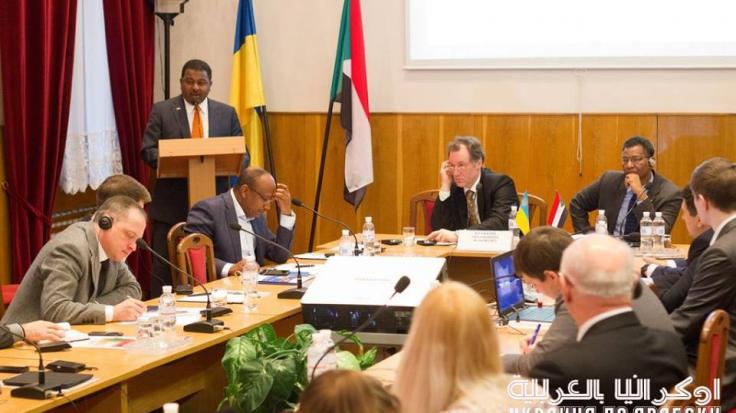Khartoum is Ready to Resume Talks in Addis Ababa ….But It Takes Two to Tango (1)

Against the backdrop of the growing popular momentum against the futile war in the country, and addressing local leaders from the Blue Nile and South Kordofan (the silent majority) on the outcome of the last round of talks, Presidential Assistant Ibrahim Mahmoud Hamid, the head of the negotiating team for Addis Ababa talks, expressed the government’s commitment towards ending the conflicts on the basis of dialogue, for the realization of a peaceful and stable Sudan. He reiterated Khartoum readiness for the resumption of the AUHIP-sponsored peace talks, calling upon the armed groups to listen to the voice of reason and manifest the necessary good-will to sign a lasting peace agreement.
The AUHIP mediators have decidedly held the armed groups culpable, for the stalemate and the eventual collapse of the recent Addis Ababa peace talks; having exhibited non-constructive attitudes and insisting upon unreasonable conditions, such as the call for dissolving the army, police and other security services, besides re-opening numerous issues previously agreed upon, and others that necessarily contradict the widely- celebrated Roadmap. Such condemnable intransigence was naturally construed as yet another calculated negotiation tactics, raised purposely to nip the talks in the bud, prompting the mediation to suspend the said talks indefinitely.
In fact, the writing has been on the wall, from the very outset, even before the start of negotiations, the leader of the armed groups got engaged in trading accusations and statements obviously meant to pre-empt and poison the otherwise hopeful atmosphere, creating about an un-conducive environment. It has become quite evident that armed groups were only dragging their feet to sign the AU-Road-map, in order to avoid and circumvent the mounting domestic and external pressure to show seriousness.
Throughout the course of the conflict, Khartoum has continued to exhibit unwavering patience for achieving peace in the country, through different regional forums, especially AU, IGAD or Doha. However, it takes two to tango; in order to have a viable peace process, the government necessarily needs to have the other group involved in the conflict, to be equally sincere towards peace.
In the last peace round for instance, the government in a good gesture, expressed inter alia, its readiness to translate the presidential declaration of the unilateral cessation of hostilities into a written agreement, however, the armed movements were not interested in any binding agreement. Regretfully, the old schemes and tactics, at the expense of peace in the Sudan, disguising the hidden agenda of these warlords and their western patrons, have not ceased.
In conformity with its responsibility to protect its citizens, Sudan government has accepted the AUHIP- proposed relief modalities and mechanisms, manifesting both readiness and willingness, to safeguard the arrival of the relief and aid to all affected civilian population, even in rebels’ held-areas. Pulling the carpet out of underneath those circles with vested interest hiding behind humanitarian operations to blackmail and weaken the government of the Sudan. Indeed with such responsible position, Khartoum is under no legal obligation to accept cross –border delivery operations from neighboring countries, however sugar-coated or sweetened with humanitarian exigencies.
This position is primarily premised on the fact that, sovereignty and territorial integrity of states are protected and enshrined by international law. Paradoxically, in the last Addis Ababa round, it is the rebels factions not the government of Sudan, which refused to accept, what the AUHIP has dubbed “balanced options” vis-à-vis the mechanisms for delivery and monitoring of humanitarian assistance to the civilians in the two areas.
To further clarify the legitimacy of Khartoum's position, let’s recall how western countries in August 2014, having accused Russia of allegedly using its military vehicles painted to look like civilian trucks, to force their way into Ukraine, to allegedly supply of weapons, equipment, and fighters to its proxies. Western countries, spearheaded by the United States, rushed to blast the so-called Russian stunt, in the strongest possible terms, as provocation and flagrant violation of Ukraine’s sovereignty and international law. The White House blasted Russian aid to rebel-held area as 'flagrant violation of Ukraine’s sovereignty'.
By the same token , and taking into account that the international law, does ‘require’ not only “ impartial ” humanitarian actors, to seek the consent of the parties concerned in relief operations, but it also mandates the respect of the said country’s sovereignty.
To that effect, Sudan has had its share of disappointments and frustration, vis-à-vis international relief operations, embodied in the operation life line.
Regretfully, In Sudan and under the “ Operation Lifeline Sudan (1989-2005) ”, tens of tones of arms, ammunitions and even land-mines were carried in airplanes supposedly carrying humanitarian assistance (blankets, medicine, food, clothing..etc.) The sinister aim by then, was serving the political and military strategies of the anti- Khartoum rebels. The noble relief operation was illegally abused and instrumented, as a part of parcel of a broader western political machination to bring about a regime change in Khartoum,
In a moment of truth, a Norwegian television documentary, entitled 'Weapons Smuggling in Sudan’ has highlighted in November 1999, the role played by some aid agencies in logistically and politically perpetuating the Sudanese civil war. The documentary clearly outlined the actions of Norwegian People's Aid (NPA) in supplying the Sudan rebels with weapons in the course of the Sudanese civil war in the 1990s.
Only fools fall for the same trap twice, perhaps the most significant lesson Khartoum should have fully extracted from the lamentable experience of OLS, is that virtuous humanitarian aid meant to aid victims of conflict, can be simultaneously manipulated to sustain and fuel the conflict itself. It is high time for Africa to derive these lessons, and to wary and guard increasingly against “the Faux humanitarianism” as it arguably feeds the war not the people.
By Mubarak M.Musa Diplomat; Sudan Embassy Kiev
sudanvisiondaily.com
